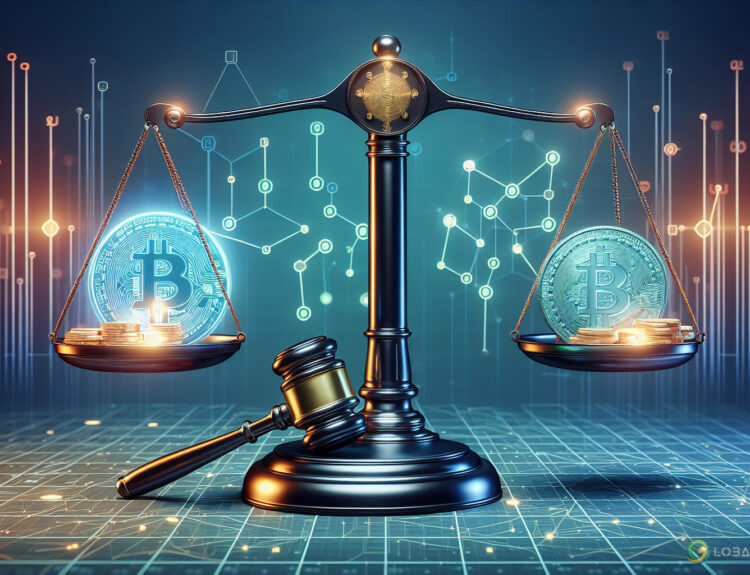Disclosure: The views and opinions expressed here belong solely to the author and do not represent the views and opinions of Global Crypto News’ editorial.
In the future, all tradable assets will be tokenized. This prediction is gaining traction as major funds from traditional finance (tradfi) add momentum to the rise of real-world asset (RWA) tokenization.
Tokenization: The Future of Tradfi Markets
Real-world assets are set to be a breakthrough in 2024. Larry Fink, CEO at BlackRock, believes that the tokenization of securities will mark the “next generation” for tradfi markets. Bernstein Private Wealth Management forecasts that tokenization could reach a market size of up to $5 trillion by 2028, driven by central bank digital currencies (CBDC), stablecoins, private market funds, securities, and real estate.
BlackRock’s Innovations in Tokenization
Earlier this year, BlackRock launched its first tokenized fund, the BlackRock USD Institutional Digital Liquidity Fund (BUIDL) on Ethereum. This fund allows investors to obtain yields in US dollars through a subscription via Securitize Markets. BNY Mellon provides interoperability for BUIDL between digital token and tradfi markets. Participants include Anchorage Digital Bank, BitGo, Coinbase, and Fireblocks.
According to RWA data, BUIDL is now the largest tokenized treasury fund, surpassing the $500 million mark in market value. This trend signifies that tokenized treasuries are finding practical applications in various financial ecosystems.
Growth in the Tokenized Treasury Market
The tokenized treasury market has seen significant growth, with its total market capitalization rising from $572.40 million to $1.79 billion, a 212.72% year-on-year increase. CoinGecko data shows an 11.7% increase in the total market capitalization of RWA-related assets over the past 24 hours.
Other Key Players in Tokenization
BlackRock’s BUIDL follows the Franklin OnChain US Government Money Fund (FOBXX) by Franklin Templeton, the first tokenized money market fund on the Stellar blockchain. This fund invests at least 99.5% of its total assets in US government securities, cash, and repurchase agreements.
In the UK, Abrdn launched the Aberdeen Standard Liquidity Fund (Lux)—Sterling Fund, the first tokenized money market fund in the UK. The UK Treasury has established a Technology Working Group to explore blockchain technology implementation in asset management, providing guidelines for asset managers to tokenize funds.
Michelle Scrimgeour, CEO at Legal & General Investment Management and chair of the working group, described these guidelines as a milestone in tokenization within the UK fund industry.
Technological Innovations
Jiritsu, a layer-one blockchain RWA platform, has integrated with BlackRock’s ecosystem to enhance RWA verification. This integration aims to revolutionize how RWAs are managed and verified, extending the concept of proof of reserves to include the precise value backing Bitcoin Exchange Traded Funds (ETFs) and any RWA.
The collaboration between BlackRock and Franklin Templeton with established participants in the digital token space demonstrates a willingness in tradfi to leverage web3 expertise for safe and scalable RWA solutions.
Advantages of Tokenization
Assets that can be tokenized include financial assets like bonds and equities, tangible assets such as land and real estate, and intangible assets like Intellectual Property (IP). The blockchain is ideally suited to represent and secure ownership of these digital assets, offering onchain transparency that empowers decentralized finance (defi) solutions.
A McKinsey & Co. report titled “Tokenization: A digital-asset déjà vu” outlines how tokenization can enhance automation in tradfi markets through the programmability of digital tokens and smart contracts.
“Fund tokenization has great potential to revolutionize how our industry operates by enabling greater efficiency and liquidity, enhanced risk management, and the creation of more bespoke portfolios,” said Michelle Scrimgeour.
Tokenization can democratize investment opportunities by providing increased liquidity, proof of ownership, and transparency. It enables assets on financial institutions’ balance sheets to be tradeable and liquid 24/7.
Drivers for Tokenization
Tokenization offers trading opportunities for corporations and high-net-worth individuals by providing more liquidity for their assets. Institutional investors benefit from a wider range of choices when investing in financial assets. The promise of smart financial contracts, including payment obligations and cash flows, will result in efficient price discovery and post-trade automation.
This efficiency allows for the construction and re-balancing of risk-return adjusted portfolios at currently unachievable cost levels.
The launch of Bitcoin ETFs this year highlights the demand in the tradfi space for blockchain-based applications. Tokenized assets are poised to bring increased transparency, liquidity, and accessibility to tradfi markets, facilitating fractional ownership and liquidity that may democratize access to high-quality investment assets. RWA could be the catalyst for the next wave of innovation, proving blockchain to be a resilient and compatible technology for the evolution of tradfi markets.
Explore more news on Global Crypto News for the latest updates in the cryptocurrency, investing, and finance world.
























